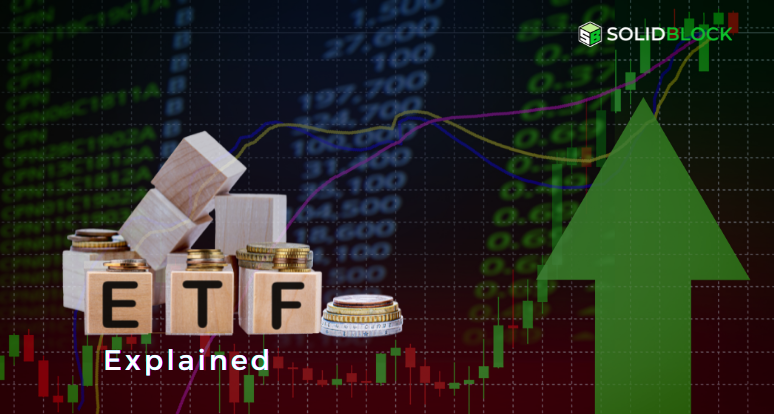
The headline read, “Grayscale and NYSE file to convert GBTC into an ETF.”
What? Really? We’re supposed to understand this?
It turns out that if you break this down into parts, we actually do understand what’s going on.
So what is an ETF?
An ETF is an exchange-traded fund, a type of security that can be traded the same way a regular stock can be traded. Sometimes ETFs are structured to track an index. A crypto ETF would track cryptocurrencies.
A market index follows the ups and downs of a specific asset, say, the price of tea in China, or the housing market in California. It’s a hypothetical portfolio of investment holdings used to calculate the prices of those holdings. Investors follow these indexes to gauge market movements. ETFs hold a basket of securities that are themselves stocks based on a market index.
You’re probably already familiar with the three most popular stock indexes for tracking the performance of the US market: the Dow Jones Industrial Average (DJIA), S&P 500 Index, and Nasdaq Composite Index.
ETFs give investors a regulated alternative to investing in the asset itself. They are also easy to trade, transparent, and more tax efficient.
Ok, so far so good. A bare-bones understanding.
In September 2019, the US Securities and Exchange Commission (SEC) passed the “ETF Rule,” removing “exemptive relief” regulations, making it easier for companies to bring their ETFs to market if certain conditions are met. By removing the need for a lengthy approval process, the “ETF Rule” may save companies up to six months and $25,000 for each new ETF.
The Future is Bright for Crypto ETFs
What does bringing new strategies to the market mean? In October 2021, the SEC greenlighted Bitcoin futures ETFs. Now companies are rushing to file with the SEC to become the first in the industry to receive approval for crypto ETFs, hoping the SEC will broaden its adoption to include cryptocurrencies themselves.
Grayscale is the biggest global digital currency asset manager, and Grayscale® Bitcoin Trust (GBTC) is the largest bitcoin trust worldwide, holding roughly 3.44% of all Bitcoins currently in circulation and with approximately $40 billion in assets under management. The filing reflects Grayscale’s ongoing commitment to converting its entire family of digital currency investment products into ETFs.
FYI, a trust is a fiduciary relationship. Trusts are established to provide legal protection for the trustor’s assets, to ensure those assets are distributed according to the wishes of the trustor, and to save time, reduce paperwork, and, in some cases, avoid or reduce inheritance or estate taxes.
And NYSE Arca? Previously known as ArcaEx, an abbreviation of Archipelago Exchange, NYSE Arca is an exchange on which both stocks and options are traded. In 2006, it merged with the New York Stock Exchange and now operates as a subsidiary of the NYSE Group, Inc.
Roll Out the Barrels?
Confused yet? Or more enlightened?
Grayscale is hoping to receive permission from the SEC to offer investments in the first exchange-traded fund that is focused on Bitcoin, to be listed and traded on NYSE Arca.
Interestingly, according to SEC Chair Gary Gensler, futures-based ETF products rather than the currencies themselves might provide stronger investor protections due to the laws under which they operate.
The SEC has in the past explicitly rejected Bitcoin ETF applications, but it doesn’t need to formally approve one. Under federal law, the SEC can just allow an application to become effective, rather than make a formal announcement, which is called tacit approval.
Lest you think this process is going to be easy, in November the SEC rejected a proposal by VanEck to operate a Bitcoin ETF on Cboe Global Markets Inc., since it was based on Bitcoin, and not on futures. And in December, Gensler zeroed in on his concerns about exchange-traded funds that directly hold Bitcoin, the latest rejection to hopes that the long-awaited crypto ETF would gain clearance by SEC regulators.
Grayscale’s attorneys have argued that the SEC’s focus on futures is unconstitutional.
Maybe the case of ProShares receiving the SEC’s permission to become the first bitcoin futures exchange-traded fund in October was an aberration that happened in the middle of upcoming holidays. Maybe their application just slipped through the cracks.
Following another trend, the Defiance Digital Revolution ETF (NFTZ) was launched this month by Defiance ETFs. This ETF will track a blockchain-related companies and non-fungible-token indexes. It won’t invest in any cryptocurrencies directly – the index tracks firms that have exposure to the industry – but it is one of the first ETFs to tap the booming market for NFTs.
It’s anyone’s guess when, and if, the SEC will allow these ETFs to receive permission to trade.
We’re holding our breath, too. But at least we understand why we’re turning blue.
To read about ETFs in more depth, check out this article.
And to learn more about SolidBlock, visit us on our website.

 by
by 

